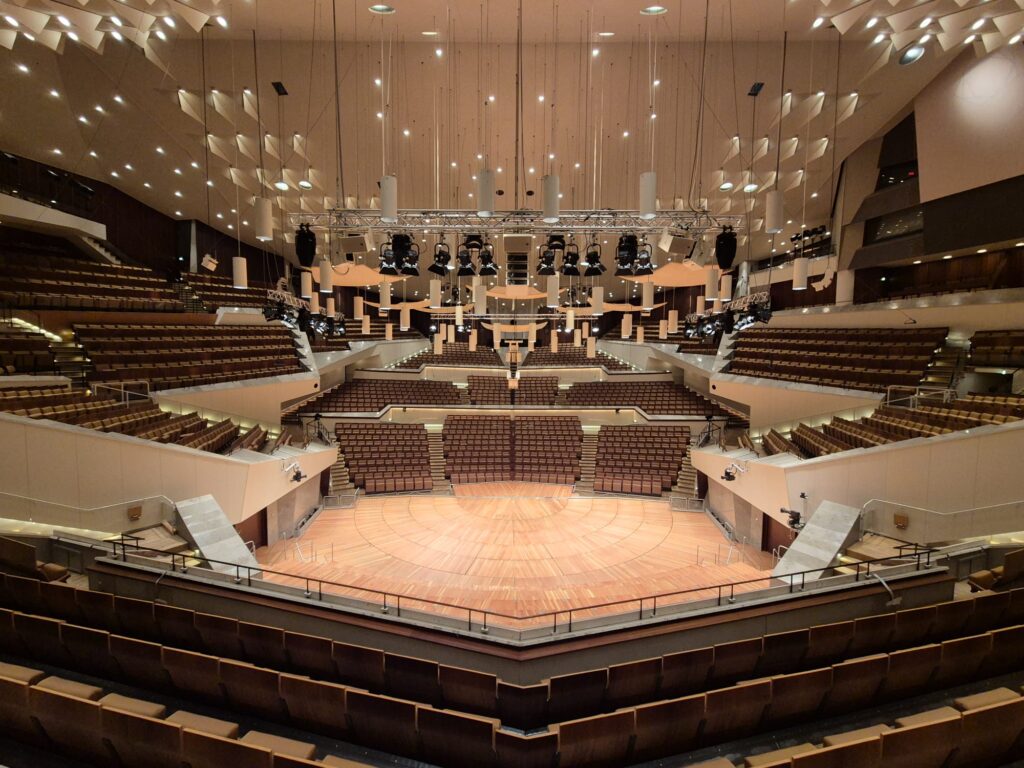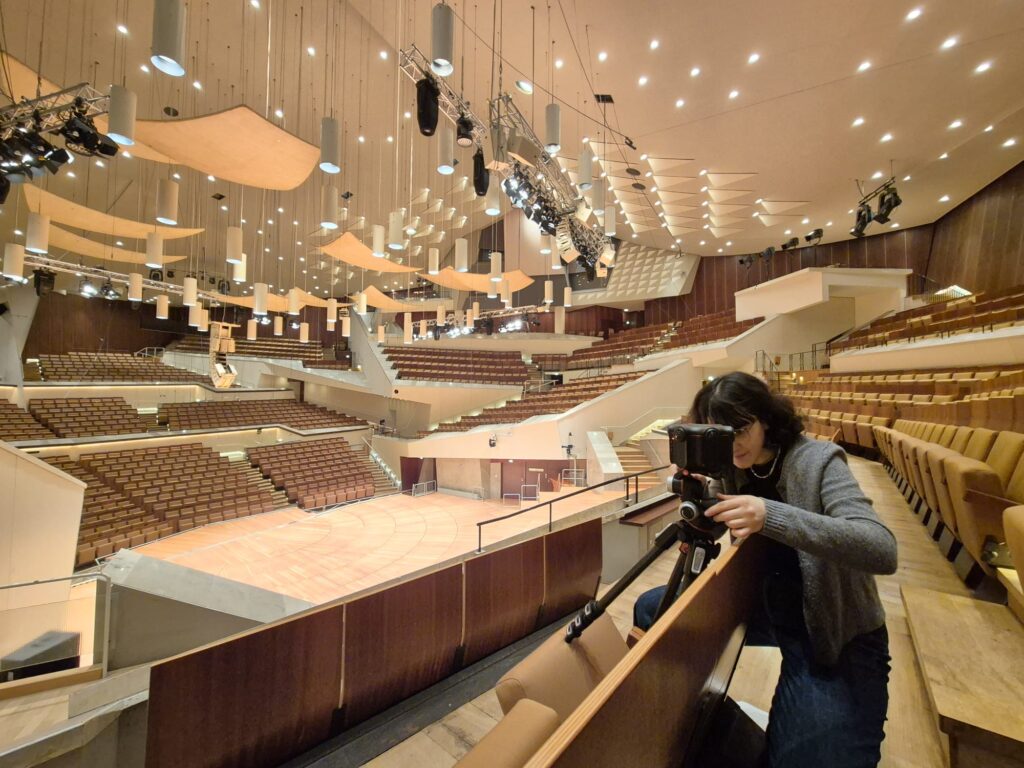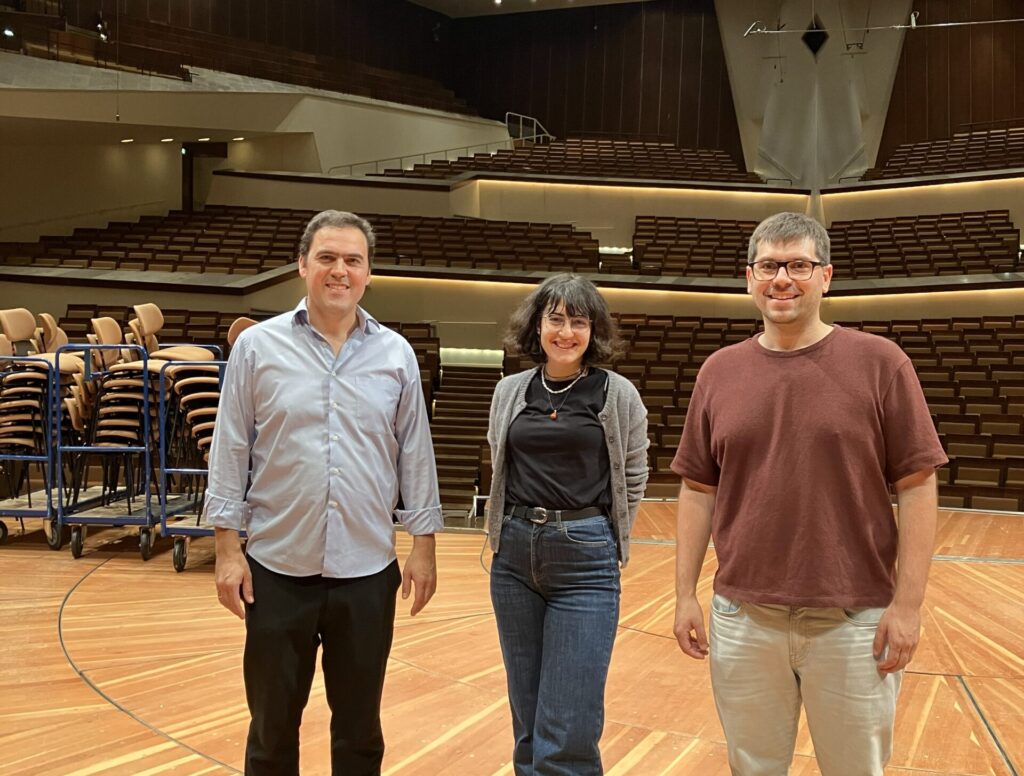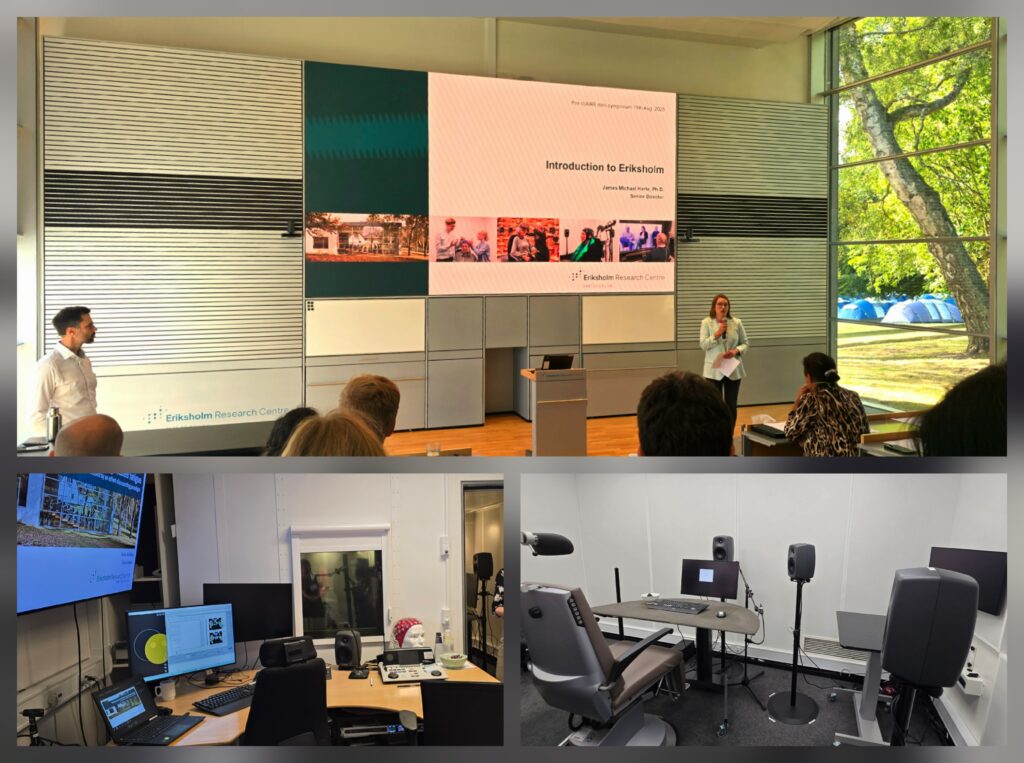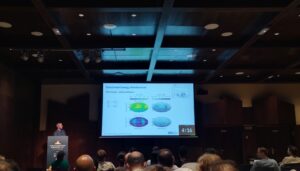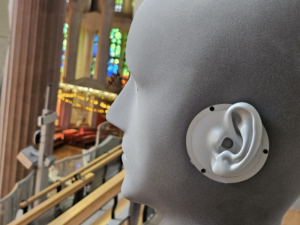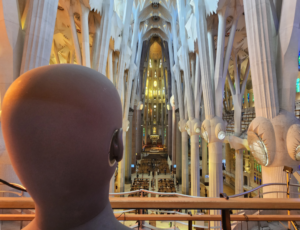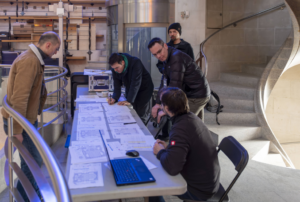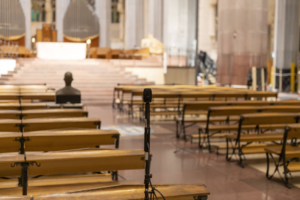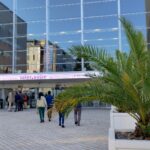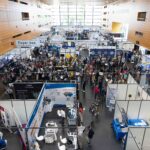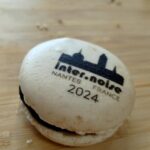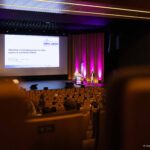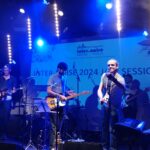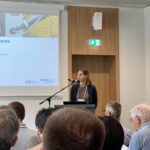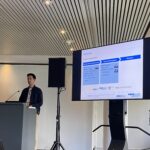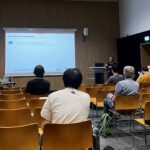Kategorie: ‘Current research’
Paper published: Heard-text recall and listening effort under irrelevant speech and pseudo-speech in virtual reality
We are happy to announce that our paper „Heard-text recall and listening effort under irrelevant speech and pseudo-speech in virtual reality“ was published this week.
The paper by Cosima A. Ermert, , , and
Using the Heard-Text-Recall (HTR) paradigm in a dual-task design, this paper evaluates the relevance of semantic meaningful background speech compared to pseudo speech in virtual reality (VR). The results highlight the relevance of semantic content both for memory of spoken content and behavioural listening effort.
Read the paper at Acta Acustica.
Joint meeting of ASA and ASJ in Honolulu
From December 1st to December 5th, the sixth joint meeting of the Acoustical Society of America (ASA) and the Acoustical Society of Japan took place in Honolulu, Hawaii. This conference included more than 70 special sessions covering various areas of of acoustics research, presented either in lecture or poster format. In addition to Michael Vorländer’s role as the president of the ASA, the Institute was involved in three scientific contributions at this conference:
- Recent Trends and Perspectives on the Use and Characterization of Acoustic Materials (Ana Jaramillo, Daniel Robinson, Arthur van der Harten, Anne Heimes, Michael Vorländer)
- Boundary Admittance Measurement Method (Peter D’Antonio, Michael Vorländer, Markus Müller-Trapet)
- Voice regulation in two-person conversations in simulated acoustic environments (Manuj Yadav, Ella Manor, Densil Cabrera, Janina Fels, Michael Vorländer)
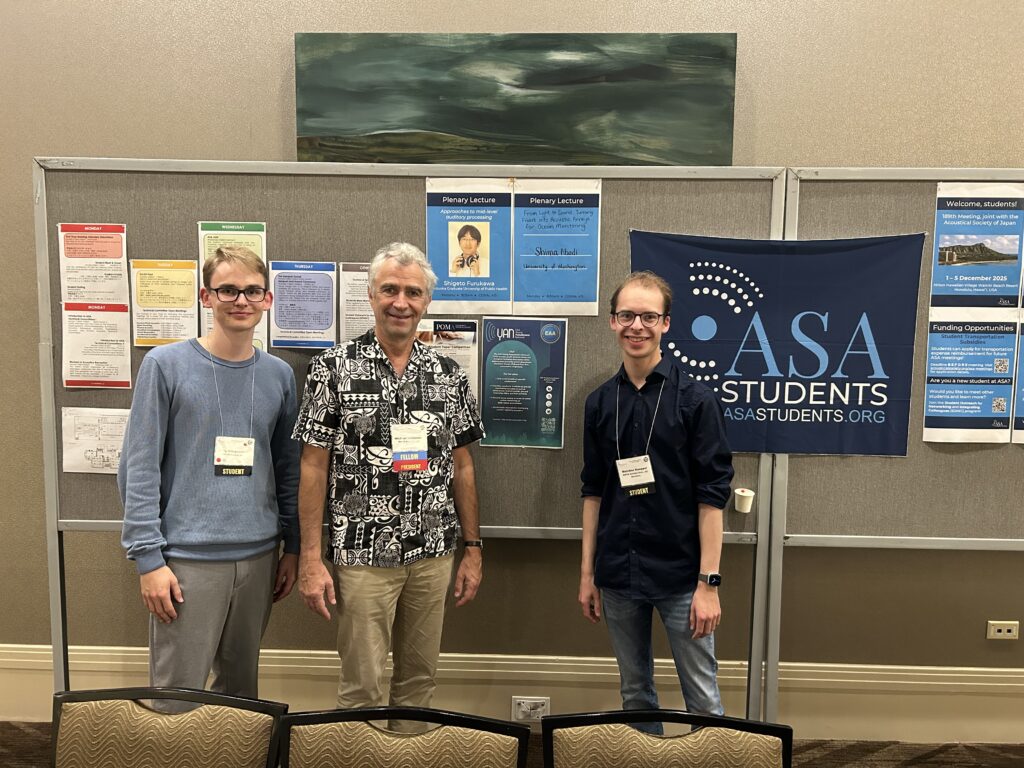
Also, IHTA students Filip Klingelnberg and Melchior Käppel attended their first international conference and represented the Young Acousticians Network (YAN) of the European Acoustics Association.
PAAD: Visual documentation of Berlin Philharmonie
PAAD „Person-focused Acoustics of Architectural Design“ research group has recently visited Berlin Philharmonie to capture 3D data of the auditorium for the MUSKLA Database: a growing collection of narrow angle and spherical photographs of major concert halls in Europe. The goal is to support state of the art multimodal perceptual studies in auditoriums by providing a reference database accessible to the scientific community. In collaboration with our colleagues from Universitat Politècnica de Catalunya and Fraunhofer-Institut für Bauphysik, our team was able to conduct a comprehensive 3D capture of the auditorium.
We documented the auditorium combining imaging techniques to ensure both geometrical accuracy and photorealistic texture:
– 360° panoramic photography to record the spatial impression and visual atmosphere of the hall, located in multiple seating positions from the audience view.
– Narrow angle photo capture to enrich the textures and surface details needed for realistic visualization and to produce accurate photogrammetric model of the hall.
- Berlin Philharmonie
- Setting up the camera equipment
- Project team
The data collected will become openly available through the MUSKLA database providing researchers and practitioners with resources to create immersive virtual experiences as well as accurate 3D models of major auditoriums.
We thank the staff who welcomed our team and supported a smooth operation throughout the day!
Paper published: Exploring auditory selective attention shifts in virtual reality: An approach with matrix sentences
We are happy to share that our paper “Exploring auditory selective attention shifts in virtual reality: An approach with matrix sentences” has been published in the Journal of the Acoustical Society of America:
https://doi.org/10.1121/10.0039864
In this study, we explored voluntary shifts of auditory selective attention in complex and more naturalistic acoustic environments. To move beyond earlier paradigms based on single-word stimuli, we introduced unpredictable German matrix sentences to simulate more realistic listening conditions.
Overall results were comparable to previous versions, but no strong reorienting effect emerged. Interaction patterns still indicate that shifting auditory attention is more demanding than maintaining it, and that preparing attention benefits performance, as reflected in decreasing reaction times for later target onsets.
This approach contributes a paradigm for investigating auditory perception and attention in dynamic room acoustic environments, helping to close the gap between laboratory setups and real-world listening.
This work was created by Carolin Breuer and Janina Fels and was funded by the German Research Foundation (DFG) as part of the Priority Program SPP2236 AUDICTIVE.
Paper Published: Exploring cross-modal perception in a virtual classroom: the effect of visual stimuli on auditory selective attention
A new paper “Exploring cross-modal perception in a virtual classroom: the effect of visual stimuli on auditory selective attention” has been published in Frontiers in Psychology, as part of the Research Topic “Crossing Sensory Boundaries: Multisensory Perception Through the Lens of Audition”: https://doi.org/10.3389/fpsyg.2025.1512851
In a virtual classroom environment, we investigated how visual stimuli influence auditory selective attention. Across two experiments, congruent and incongruent pictures modulated performance during an auditory attention task: concurrent visual input increased response times overall, and incongruent pictures led to more errors than congruent ones. When visual stimuli preceded the sounds, the timing mattered — positive priming at 500 ms, but semantic inhibition of return at 750 ms.
These results highlight that cross-modal priming differs from multisensory integration, and that temporal dynamics between modalities substantially shape attentional behaviour.
This work was a collaboration between Carolin Breuer, Lukas Jonathan Vollmer, Larissa Leist, Stephan Fremerey, Alexander Raake, Maria Klatte and Janina Fels.
It was funded by the Priority Programme SPP2236 AUDICITVE and the Research Training Group (RTG) 2416 – MultiSenses, MultiScales, both of which are funded by the German Research Foundation (DFG).
Many thanks to everyone involved.
Paper published: The influence of complex classroom noise on auditory selective attention
We are very glad to share that our paper “The influence of complex classroom noise on auditory selective attention”, based on the bachelor’s thesis of Robert Schmitt, which we co-authored, has just been published in Scientific Reports: https://www.nature.com/articles/s41598-025-18232-2
It has been a real pleasure to supervise this work and to see it evolve into a full publication. In the study, we examined how plausible classroom noise affects auditory selective attention in a virtual reality classroom environment.
Our results underline the importance of studying realistic and complex acoustic scenarios to gain more reliable and valid insights into auditory perception by showing higher error rates in the auditory attention task under complex noise conditions, as well as an increased perceived listening effort when the background contained intelligible speech.
The paper was developed within the ECoClass-VR project, part of the DFG Priority Program SPP 2236 AUDICTIVE on Auditory Cognition in Interactive Virtual Environments. More information at www.spp2236-audictive.de.
We hope these findings contribute to advancing our understanding of auditory attention in complex, real-world listening situations.
Many thanks to the co-authors Robert Schmitt, Larissa Leist, Stephan Fremerey, Alexander Raake, Maria Klatte, and Janina Fels, and to the AUDICTIVE community for the inspiring collaboration and support.
Research data publications at IHTA
In recent years, the importance of open data in academic research has become increasingly prominent. Open data in the context of scientific research refers to the practice of making datasets publicly accessible, either as separate data publications or as supplementary material along with the research article. Making such (documented) data available allows other researchers to build upon existing work or to verify findings. This makes research more efficient, transparent and reproducible. Research data publications are usually assigned a DOI, providing a permanent link to the dataset, which can be cited properly in related scientific work.
Researchers from the Institute for Hearing Technology and Acoustics have published several datasets in the past years – many of them being different kind of HRTF datasets, but also other acoustic measurements, input data for simulations and stimuli for listening experiments. To give a better overview of these data publications, we recently updated the corresponding section on our website, which also lists IHTA’s research software. Further datasets, if published on the Zenodo platform, can also be found in IHTA’s Zenodo-Community.
Paper published: Serial recall in spatial acoustic environments: irrelevant sound effect and spatial source alternations
We are happy to announce that Cosima Ermert, Manuj Yadav, John E. Marsh, Sabine Schlittmeier, Torsten W. Kuhlen, and Janina Fels recently published their article Serial recall in spatial acoustic environments: irrelevant sound effect and spatial source alternations in Scientific Reports!
Environments with multiple, spatialized sound sources present unique challenges for verbal short-term memory – particularly in the presence of background noise and when the location of target talkers changes. In this study, we investigated how switches of spatial location and the type of irrelevant background sounds in complex acoustic scenes influence the ability to remember sequences of items within the serial recall.
Our findings reveal that the type of background noise plays a crucial role in memory performance, strongly affecting the recall of sequences. Interestingly, changes in spatial location only disrupt memory when switches occur at a fast rate – much faster than rates in natural conversations. This highlights the importance of both acoustic content and movement dynamics in understanding listening and memory challenges in realistic conversational situations.
This research was carried out within the priority program SPP2236 AUDICTIVE funded by the German Research Foundation (DFG).
Janina Fels und Cosima Ermert beim „International Symposium on Auditory and Audiological Research – ISAAR 2025“
Vom 19. bis 22. August 2025 reisten Janina Fels und Cosima Ermert nach Dänemark, um das „International Symposium on Auditory and Audiological Research – ISAAR 2025“ in Nyborg zu besuchen.
Janina Fels hielt einen eingeladenen Vortrag zum Thema „Exploring Auditory Cognition: Connecting Real-World Contexts with Interactive Virtual Environments” und stellte dabei mehrere laufende Forschungsvorhaben vor, die sich speziell mit selektiver auditiver Aufmerksamkeit und Höranstrengung (Listening Effort) bei Kindern in Klassenräumen unter realistischen Hörbedingungen befassen.
Cosima Antonia Ermert präsentierte dazu ein Poster mit dem Titel „Listening Effort in Populated Audiovisual Scenes Under Plausible Room Acoustic Conditions”.
Einen Tag vor der ISAAR reiste Janina Fels zum „Pre-ISAAR Mini-Symposium“ beim Eriksholm Research Centre. Sie hatte die Gelegenheit, mehr über aktuelle Themen und Projekte zu erfahren und diese ausführlich zu diskutieren. Es fand eine exzellente Führung durch die Labore statt und es wurden zahlreiche hochinteressante Posterpräsentationen abgehalten. Zudem wurden eine Vielzahl neuer Ideen für zukünftige Kooperationen diskutiert.
Währenddessen nahm Cosima Ermert am „Workshop in Communication in Hearing Science” von WS Audiology teil. Dieser Workshop beschäftigte sich mit dem Thema „Understanding how noise and hearing impairment affect communication”. Cosima präsentierte für das IHTA ein Poster mit dem Titel „Bringing real-life into the lab: Investigating speech in virtual auditory environments – which aspects contribute to a plausible simulated conversational situation?”.
Paper published: Audiovisual angle and voice incongruence do not affect audiovisual verbal short-term memory in virtual reality
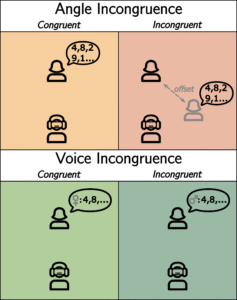 We are happy to announce that our paper Audiovisual angle and voice incongruence do not affect audiovisual verbal short-term memory in virtual reality by Cosima A. Ermert, Manuj Yadav, Jonathan Ehret, Chinthusa Mohanathasan, Andrea Bönsch, Torsten W. Kuhlen, Sabine J. Schlittmeier, and Janina Fels has just been published in PLOS ONE.
We are happy to announce that our paper Audiovisual angle and voice incongruence do not affect audiovisual verbal short-term memory in virtual reality by Cosima A. Ermert, Manuj Yadav, Jonathan Ehret, Chinthusa Mohanathasan, Andrea Bönsch, Torsten W. Kuhlen, Sabine J. Schlittmeier, and Janina Fels has just been published in PLOS ONE.
Virtual reality is increasingly used in research to simulate realistic environments – possibly increasing ecological validity. However, the visual component in virtual reality can affect participants, especially if there are incongruencies between auditory and visual information. In this study, we investigated verbal short-term memory under two types of audio-visual incongruencies: an angle incongruence, where the perceived position of the sound source did not match that of the visual representation, and a voice incongruence, where two virtual agents switched voices. The task was presented either on a computer screen or in virtual reality. We found no effect of the incongruencies or the display modality (computer screen vs. virtual reality), highlighting the complexity of audio-visual interaction.
This research is part of the priority program AUDICTIVE and was a cooperation with researchers from the Visual Computing Institute and the Work and Engineering Psychology at RWTH Aachen University.
Project Kick-off: SWOISE – UAS Swarms for Noise Reduction
Unmanned aerial systems (UAS), such as drones, are becoming increasingly popular for wide range of applications, ranging from delivery and mapping to surveillance. The emergence of the UAS swarm systems, where multiple UAS operate in coordinated formations, might offer advantages regarding improved efficiency and reduced logistical effort. However, UAS swarms also raise concerns about noise pollution, especially in urban environments. The SWOISE project aims to address this issue by investigating the noise generated by drone swarms, how it is perceived by humans, and how swarm configurations can be optimized to minimize acoustic impact. Within the project, the task of IHTA is to focus on the psychoacoustic analysis of UAS swarm noise by creating binaural sound samples using simulations of urban overflights, and analyzing them through perceptual and objective evaluations. This research will be mostly carried out by our post doctoral researcher Jithin Thilakan, who recently joined our team.
SWOISE is funded by the German aviation research program LuFo VI-3 and brings together four research partners:
- Institute of Air Transport Systems (ILT), TU Hamburg (Prof. Dr.-Ing. Volker Gollnick)
- Chair of Flight Guidance and Air Traffic, TU Berlin (Prof. Dr. ir. Maarten Uijt de Haag)
- Institute for Hearing Technology and Acoustics (IHTA), RWTH Aachen University (Prof. Dr.-Ing. Janina Fels)
- German Aerospace Center (DLR Hamburg: Institute of Air Transport – associate partner)
The project officially launched with a kick-off meeting on July 8th, 2025, at TU Hamburg, where researchers from all partner institutions gathered to discuss the research plans and future steps. We look forward to advancing this collaborative effort and contributing towards quieter and more environment-friendly aviation.

The SWOISE research team at the official kick-off meeting at TU Hamburg
IHTA at Forum Acusticum Euronoise 2025 in Malaga
At the end of last month, the scientific conference Forum Acusticum Euronoise successfully took place in Malaga, Spain, organized by members of the Spanish Acoustics Society (SEA). Across four days, a total number of 1250 delegates participated and presented interesting research results in the field of acoustics and noise, accompanied by an engaging social program. The Institute for Hearing Technology and Acoustics was represented by Lukas Aspöck and our former colleague Marco Berzborn, who altogether organized three technical sessions and contributed to five papers:
- Marco Berzborn and Michael Vorländer: Stochastic Variational Inference of Directional Decay Times in a Reverberation Room
- Lukas Aspöck, Michael Vorländer and Janina Fels: Rendering complex acoustic scenes for perception experiments
- Marco Berzborn and Michael Vorländer: Analysis of the relationship between sound field isotropy and errors in the results of Sabine’s absorption coefficient
- Lukas Aspöck, Pascal Palenda, Janina Fels and Michael Vorländer: Application of room acoustics simulation software in university teaching
- Fabian Brinkmann, Marco Berzborn, […] Anne Heimes, Simon Kersten, Pascal Palenda et al.: Open educational resources for acoustics and audio signal processing using Jupyter notebooks and pyfar
- Entrance of conference venue in Malaga
- Opening on Monday: Plenary lecture on underwater sounds by Ana Sirovic
- IHTA alumni group picture
- Marco Berzborn during one of this presentation
Paper published: Cross-modal congruency modulates evidence accumulation, not decision thresholds
We are happy to announce that our paper „Cross-modal congruency modulates evidence accumulation, not decision thresholds“ was published as part of the Research Topic „Crossing Sensory Boundaries: Multisensory Perception Through the Lens of Audition“ in Frontiers in Neuroscience.
In this study, we collaborated with Björn Kampa from the Systems Neurophysiology Department of the Institute of Zoology here at RWTH Aachen University, and Christoph Kayser from the Department of Cognitive Neuroscience at Universität Bielefeld. We explored how audio-visual stimulus pairs—linked either by co-occurrence or by shared meaning—affect behavior and brain activity during decision-making.
By combining behavioral data from a decision-making task with brain activity measured via electroencephalography (EEG), we found two key stages that shape perceptual decisions: an early, sensory-driven stage, and a later, decision-related stage. Interestingly, whether the stimulus pairing was expected in terms of co-occurrence or meaning played a major role in how these early and late components contributed to the decision-making process.
Paper published: Activity-based acoustic situations in primary schools
We are happy to share a new publication by Julia Seitz and Janina Fels. Their journal paper „Activity-based acoustic situations in primary schools: Analyzing classroom noise and listening effort“ was published in the Journal of the Acoustical Society of America.
The publication introduces the concept of „activity-based acoustic situations“ in primary schools, shedding light on the everyday sound environment in classrooms.
Key findings include that different classroom activities result in significantly different noise levels, that noise levels decrease as students age—first graders experience higher levels than fourth graders—and that subjective listening effort does not differ significantly between activities. The results highlight the importance of activity-based assessment of classroom noise to create optimal learning environments.
IHTA Contributions to DAS|DAGA 2025
This year’s DAS|DAGA 2025 is the joint annual meeting of the Danish and German Acoustical Societies (DAS and DEGA). The conference takes place in Copenhagen from 17th to 20th of March, 2025. As usual, IHTA members will present their work on the plethora of research topics covered at IHTA. This year, the IHTA is involved in a total of 23 contributions. In addition, the IHTA has been very active in organizing special sessions and events (see below).
We are happy to invite you to our presentations and posters!
You can find the full conference program in the DAS|DAGA Web-App. Every contribution in the table below links to its entry in the web-app, where you can read its abstract and add it to your personal conference schedule.
We are looking forward to meet you there!
| Monday, March 17 | ||||
| Simon Kersten, Michael Vorländer | Physical Mechanisms Underlying the Occlusion Effect | Precolloquium: Hearing Acoustics: Models, algorithms and applications | 12:25 | Room 20 |
| Tuesday, March 18 | ||||
| Rouben Rehman, Simon Kersten, Janina Fels | An Experimental Setup for the Estimation and Emulation of Bone and Air Conducted Components of One’s Own Voice | Methods for Technical and Perceptual Evaluations of Hearing Devices 1 | 14:20 | Room 19 |
| Kristin Ohlmann, Simon Kersten, Michael Vorländer, Birger Kollmeier | Perceptual Estimation of the Bone Conduction Path for One’s Own Voice | Psychoacoustics (Poster) | 15:20 | Hall E, Poster Island H |
| Cornelius Frankenbach, Carsten Herzog, Julia Seitz, Janina Fels | Comparing Localization Accuracy With Generic, Estimated, and Individual HRTFs Using Dynamic Binaural Synthesis | Binaural Technologies | 16:40 | Room 5 |
| Julia Seitz, Janina Fels | A Questionnaire Suitable to Assess Listening Effort in Children and Adults | Noise Effects in Children | 17:40 | Hall B - Sydhavn (B4M4) |
| Wednesday, March 19 | ||||
| Nils Rummler, Gülnihan Atay, Josep Llorca-Bofí, Michael Vorländer | RAVEN Benchmark Using the Loudspeaker Orchestra | Virtual Acoustics 2 | 8:40 | Room 5 |
| Lara Stürenburg, Lukas Aspöck, Janina Fels | Investigating the Perception of a Heat Pump in Different Audio-Visual Settings | Effects of Noise & Noise Policy | 10:00 | Hall B - Sydhavn (B4M4) |
| André Kruh-Elendt, Christian Laufs, Jonas Heck, Janina Fels, Moritz Lippold, Christoph Klanten, Andreas Herweg | Evaluation of Stress in Response to Traffic Noise Using Virtual Reality | Effects of Noise & Noise Policy | 10:20 | Hall B - Sydhavn (B4M4) |
| Thomas Deutsch, Luigi Falanga, Iring Koch, Janina Fels | Spatial Release From Masking With and Without Simulated Hearing Loss: Comparison of Different Spatial Audio Reproduction Methods | Audiological and Medical Acoustics | 11:00 | Room 19 |
| João Fatela, Anne Heimes, Michael Vorländer | Efficient Acoustic Radiosity Modelling for Precise Bi-directional Reflectance Distribution Patterns | Virtual Acoustics 2 | 11:20 | Room 5 |
| Marco Berzborn, Michael Vorländer | Stochastic Inference of Directional Decay Times in a Reverberation Room | Room Acoustics 2 | 15:00 | Aud 15 |
| Lukas Aspöck, Chalotorn Möhlmann, Philipp Schäfer, Hanna Potulski, Vanessa Overhage, Thomas Gries, Christa Reicher, Janina Fels | Acoustic Simulation and Auralizations to Investigate the Impact of Textile Building Façades in Urban Environments | Effects of Noise & Noise Policy (Poster) | 15:20 | Hall E, Poster Island D |
| Gülnihan Atay, Josep Llorca-Bofí, Michael Vorländer | Audio-Visual Perception of Loudness in Concert Halls | Room Acoustics (Poster) | 15:20 | Hall E, Poster Island B |
| Manan Lamba, Simon Kersten, Stephan D. Ewert, Michael Vorländer, Birger Kollmeier | Perceived Level Differences at Equal Loudness in Headphone-Based Comparisons of Virtual Room Acoustics and Diotic Stimuli | Room Acoustics (Poster) | 15:20 | Hall E, Poster Island B |
| Alexander Raake, Stephan Fremerey, Carolin Breuer, Larissa Leist, Maria Klatte, Janina Fels | Evaluation of Audiovisual Scene Analysis in Virtual Reality Classroom Scenarios | AUDICTIVE 1 - Auditory Cognition in Interactive Virtual Environments | 16:20 | Room 6+7 |
| Carolin Breuer, Larissa Leist, Stephan Fremerey, Alexander Raake, Maria Klatte, Janina Fels | Exploring the Impact of Room Acoustics on Auditory Selective Attention | AUDICTIVE 1 - Auditory Cognition in Interactive Virtual Environments | 17:40 | Room 6+7 |
| Thursday, March 20 | ||||
| Cosima A. Ermert, Jonathan Ehret, Chinthusa Mohanathasan, Andrea Bönsch, Torsten W. Kuhlen, Sabine J. Schlittmeier, Janina Fels | Influence of (Non) Intelligible Background Speech on Memory and Listening Effort in Conversational Situations | AUDICTIVE 2 - Auditory Cognition in Interactive Virtual Environments | 8:40 | Room 6+7 |
| Lukas J. Vollmer, Leonie Schmitz, Karin Loh, Janina Fels | Cue-Related Evoked Potentials Capture Auditory Attention Switches | AUDICTIVE 2 - Auditory Cognition in Interactive Virtual Environments | 9:20 | Room 6+7 |
| Pascal Palenda, Christoph Kirsch, Stephan D. Ewert, Michael Vorländer | Validation of a Simplified Higher-Order Diffraction Model in Urban Environments | Outdoor Sound Propagation 1 | 9:20 | Hall B - Nørrebro (B3M1) |
| Christoph Kirsch, Pascal Palenda, Michael Vorländer, Stephan D. Ewert | A Toolbox for Filter-Based First- and Higher-Order Edge Diffraction Modeling | Outdoor Sound Propagation 1 | 9:40 | Hall B - Nørrebro (B3M1) |
| Moritz Bender, Jamilla Balint, Janina Fels | A Study on Voice Quality and Vocal Fatigue of Lecturers in Lecture Halls | Speech Processing 1 | 10:40 | Room 19 |
| Anne Heimes, Densil Cabrera, Michael Vorländer | Determination of Bidirectional Scattering Coefficients From Measured Scattering Patterns | Outdoor Sound Propagation 2 | 14:00 | Hall B - Nørrebro (B3M1) |
| Chalotorn Möhlmann, Lukas Aspöck, Janina Fels | Auralization of Vehicle Pass-By Using Impulse Responses of Dynamic Urban Environments | Outdoor Sound Propagation 2 | 15:20 | Hall B - Nørrebro (B3M1) |
| Jonas Heck, Josep Llorca-Bofí, Michael Vorländer, Janina Fels | Efficient Modeling of Urban Traffic Scenarios for Virtual Reality | Virtual Acoustics 3 | 15:40 | Room 5 |
| Organized Sessions | ||||
| Noise Effects in Children | Julia Seitz, Kerstin Persson Waye | Tuesday, 18.03.2025 | 16:00 - 18:20 | Hall B - Sydhavn (B4M4) |
| AUDICTIVE 1 - Auditory Cognition in Interactive Virtual Environments | Janina Fels, Carolin Breuer | Wednesday, 19.03.2025 | 16:00 - 18:00 | Room 6+7 |
| AUDICTIVE 2 - Auditory Cognition in Interactive Virtual Environments | Thursday, 20.03.2025 | 08:40 - 11:00 | ||
| Junge DEGA Events | ||||
| Icebreaker | junge DEGA Jonas Heck, Tabea Breitkreutz, Lara Stürenburg | Monday, 17.03.2025 | 15:00 - 16:00 | Balcony 1, in front of Auditorium 10-12 (Plenary hall) |
| Pub night | Monday, 17.03.2025 | 20:00 - 23:00 | The Moose (Sværtegade 5, 1118 København K) | |
| Speed Dating — Meet the Acousticians | Tuesday, 18.03.2025 | 17:40 - 18:20 | Hall B - Nordhavn (B3M10) | |
| Research in short(s) & Power-Point-Karaoke | Wednesday, 19.03.2025 | 16:00 - 17:20 | Room 20 | |
| Mentoring-Café | Wednesday, 19.03.2025 | 17:20 - 18:00 | Room 18 | |
| Other Events | ||||
| Frauen@DEGA Meeting | Karin Loh, Cleopatra Christina Moshona | Thursday, 20.03.2025 | 12:30 - 14:00 | Room 5 |
| Hands-On Workshop: PYFAR - Python Packages for Acoustics Research | IHTA (RWTH Aachen University), Audio Communication Group (TU Berlin), Department of Engineering Acoustics (TU Berlin), Institute of Communications Engineering (TH Köln) | Thursday, 20.03.2025 | 12:30 - 14:00 | Room 6+7 |
Aachen Acoustics Colloquium 2024
Currently the 15th Aachen Acoustics Colloquium is taking place at Parkhotel Quellenhof in Aachen. This year’s scientific program includes 26 interesting contributions (2 Keynotes, 18 presentations and 6 poster presentations) about current research within the area of automotive acoustics, accompanied by a technical exhibition from various companies and research institutes. A detailed overview of the program can be found in this PDF.
Our institute is part of the organizing team of this event, which is attended by around 190 persons (~170 in-person and 22 online). On Tuesday morning, Michael Vorländer chaired the session „Infotainment in the vehicle“ including a very interesting keynote presentation by Hermann Ney on the current progress in speech and language technology. In the following session about numerical methods and simulations, our research assistant Christian Dreier held a presentation titled „Speed-dependent directivity patterns of road traffic sound sources“.
Additionally at the exhibition, our Institute presented current progress of research projects, e.g., the BalSaM project, in form of interactive demonstrations.
- Hosting team of the AAC: Lutz Eckstein (ika), Klaus Genuit (HEAD acoustics), Michael Vorländer (IHTA) and Stefan Pischinger (fev). Photo: Stefan Hense.
- Christian Dreier during his presentation. Photo: Stefan Hense.
Paper published: Listening effort in children and adults in classroom noise
We are happy to share the publication of our journal paper „Listening effort in children and adults in classroom noise“ in Scientific Reports as part of the Auditory processing and perception collection!
Julia Seitz, Karin Loh, and Janina Fels conducted a study to investigate listening effort in children aged 6-10 years and young adults using a child-appropriate dual-task paradigm. Realistic classroom scenarios with multi-talker babble noise at different signal-to-noise ratios in anechoic and simulated classroom environments were investigated.
The key findings
• Found differences in listening effort between noise conditions in 8-10-year-olds
• Demonstrated the importance of considering room effects in listening experiments
• Observed correlations between subjective and behavioral measures of listening effort
This research contributes to our understanding of how children process speech in noisy classroom environments and could help to improve learning conditions.
Acoustic investigations at Sagrada Familia
At the end of February this year, a team of the Institute for Hearing Technology and Acoustics conducted acoustic measurements at the renown Basílica de la Sagrada Família in Barcelona. The team of experienced acousticians consisted of current and former employees of IHTA and was led by Josep Llorca-Bofí and Michael Vorländer.
In the further course of the project, the measurement data was evaluated, processed and auralizations were generated. The study revealed Gaudi’s design challenges and opportunities and is a basis for future musical instruments design in different places and its liturgical use of the Sagrada Família Foundation.
- IHTA’s dummy head in the Basilica. Photo: Josep Llorca-Bofi.
- IHTA’s dummy head in the Basilica. Photo: Josep Llorca-Bofi.
- IHTA’s team coordinating the acoustic measurements. Photo: Gottfried Behler.
- IHTA’s dodecahedron measurement speaker was used in Basicila Familia to determine room impulse responses. Photo: Gottfried Behler.
- Microphones used in the central seating area of the Basilica. Photo: Gottfried Behler.
- IHTA’s team at the basilica. Photo: Gottfried Behler.
Inter-Noise 2024 in Nantes
This year’s Inter-noise conference took place from August 25th to 29th in Nantes, France. More than 1500 delegates participated in this conference and presented interesting research in the field of acoustics and noise. Highlights of the conference included a plenary talk by Arnaud Can and Pierre Aumond (Joint Research Unit in Environmental Acoustics at Gustave Eiffel University, Nantes, France) on advanced characterization of urban sound environments and a keynote lecture about the child perspective on noise exposure and health effects, held by Kerstin Persson Waye from Gothenburg University, Sweden, who is also collaborating with IHTA in the Equal-Life project.
Members of IHTA travelled to the conference and presented the following research papers:
- Chalotorn Möhlmann: Validation measurement of vehicle pass-by models for dynamic urban environments (results of the BaLSaM project)
- Marco Berzborn: Inference of the acoustic properties of transversely isotropic porous materials
- Lara Stürenburg: Loudness and preference judgments for noises of a heat pump (results of the LowNoise project)
- Joao Fatela (Guest researcher from the University of Campania Luigi Vanvitelli, Naples, Italy):
An experimental setup to investigate relevant validation parameters for the auralization of commercial aircraft flyovers in complex urban contexts
Directly after the closing ceremony of the conference, the satellite workshop “Unlocking the Potential of Open Research Software in Acoustics at Inter-Noise 2024” started. This event was organized by Maarten Hornikx and Huiqing Wang, from the Building Acoustics team of Eindhoven University of Technology, and included interesting exchanges and presentation on the development, maintenance, documentation and distrubtion of acoustics-related open-source software. As one of four invited speakers, Lukas Aspöck held a presentation about IHTA’s auralization software Virtual Acoustics. The slides of this presentation are available for download (CC BY-SA 4.0).
Next to insightful overview presentations by Maarten Hornikx and Huiqing Wang, further successful research software was presented: Pyroomacoustics by Eric Bezzam, NoiseModelling by Pierre Aumond and SoundScapy by Andrew Mitchell, along with many examples of challanges and best practices for open research and open-source software development. Many thanks to Maarten and his team for the invitation and the organization of this exciting event.
- Entrance of the InterNoise venue. Photo: Lukas Aspöck
- Exhibition area at Internoise. Photo: Simon Bianchetti.
- Internoise 2024 Macarons. Photo: Lukas Aspöck
- Kerstin Persson Waye at her keynote presentation. Photo: Simon Bianchetti.
- Jam Session @ InterNoise. Photo: Lukas Aspöck
- Lara during her presentation. Photo: Lara Stürenburg.
- Chalotorn during his presentation. Photo: Carolin Schliephake.
- Lukas during the research software workshop. Photo: Enkela Alimadhi
Einladung zum Halbzeittreffen des BaLSaM-Projekts am 21.5.
Das Konsortium des Projekts “Braunkohlereviere als attraktive Lebensräume durch Straßengeräuschsimulation auf Basis bestehender Verkehrsdaten zur Minimierung von Lärm”(BaLSaM) lädt zum öffentlichen Halbzeittreffen ein. Es wird am 21.5.2024 von 8:30-13:00 Uhr im Institut für Kraftfahrzeuge der RWTH Aachen University stattfinden (Adresse: Steinbachstraße 7, 52074 Aachen, Deutschland).
Während des Treffens werden die Projektpartner den bisherigen Fortschritt des Projekts zu präsentieren. Darüber hinaus wird das Event die Gelegenheit bieten, Erfahrungen auszutauschen und gemeinsam an zukünftigen Herausforderungen und Fragestellungen zu arbeiten. Neben der Teilnahme vor Ort ist auch eine digitale Teilnahme an der Veranstaltung möglich. Bitte füllen Sie in beiden Fällen das folgende Formular aus, um sich für die Teilnahme zu registrieren.
Anmeldung: https://www.balsam-projekt.de/de/halbzeitevent.html
Agenda:
| 08:30 | Ankommen |
| 09:00 | Begrüßung |
| 09:10 | Projektvorstellung |
| 09:30 | Beschreibung der Schallquelle Fahrzeug |
| 10:00 | AVAS-Geräuschband & Lärmwahrnehmung |
| 10:30 | Kaffeepause |
| 11:00 | Schallausbreitungssimulation |
| 11:30 | Optimierungsstudie |
| 12:00 | Pause für offenen Austausch |
| 12:30 | Abschluss mit Institutsführung |
— English version —
The consortium of the project “Braunkohlereviere als attraktive Lebensräume durch Straßengeräuschsimulation auf Basis bestehender Verkehrsdaten zur Minimierung von Lärm” (BaLSaM) invites you to the public mid-term meeting. It will take place on May 21, 2024 from 8:30-13:00 at the Institute of Automotive Engineering at RWTH Aachen University (address: Steinbachstraße 7, 52074 Aachen, Germany).
The BaLSaM project investigates how traffic noise can be simulated and auralized, aiming to develop concepts to minimize road noise to create more pleasant environments. During the meeting, the project partners will present the progress of the project. In addition, the event will provide an opportunity to exchange experiences and discuss future challenges and research questions. In addition to on-site participation, digital participation in the event is also possible. In both cases, please fill out the following form to register for participation.
Agenda and registration: https://www.balsam-projekt.de/de/halbzeitevent.html


